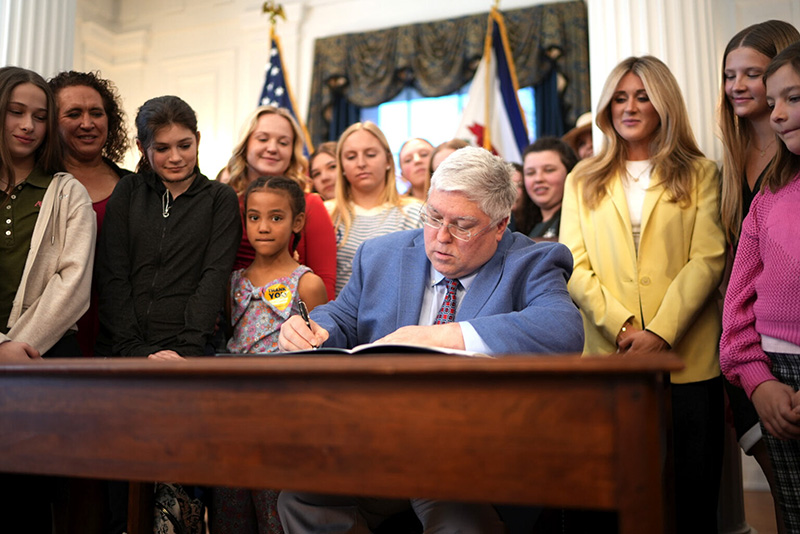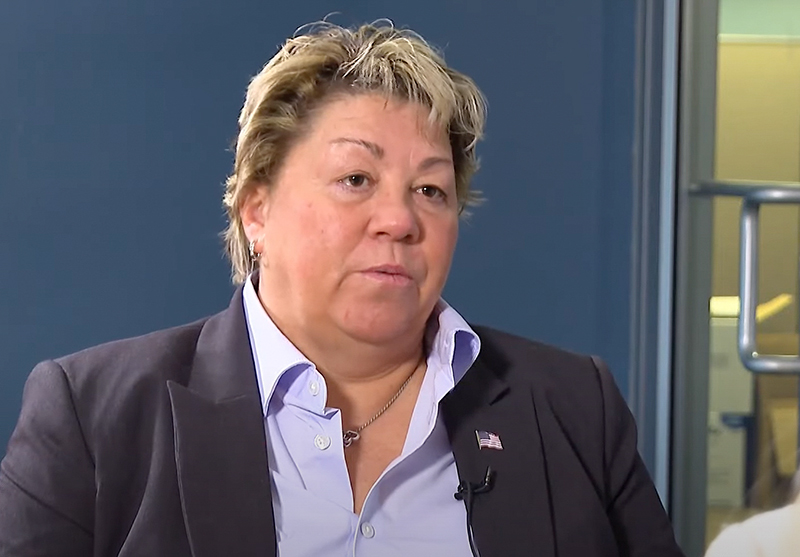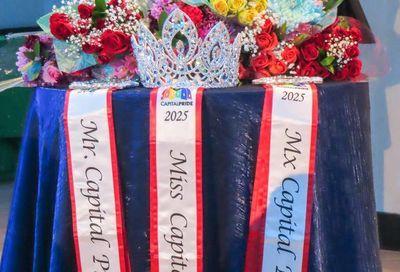Two transgender men sue West Virginia over policy blocking them from changing their birth certificates
Both men say they worry about being discriminated against or harassed if forced to "out" themselves under the policy.

Two transgender men have are suing West Virginia state officials over a policy blocking them from changing the gender marker on their birth certificates to reflect their gender identity.
Last year, the West Virginia Supreme Court of Appeals ruled that circuit judges could no longer issue court orders directing the state Department of Health and Human Resources to correct gender markers on transgender residents’ birth certificates.
While that means the department has the power to change the gender markers on their own, without a court order, the department has instead used the decision to justify its refusal to amend trans residents’ birth certificates altogether.
In response, the American Civil Liberties Union, the ACLU of West Virginia, and the Harvard Law School LGBTQ+ Advocacy Clinic filed a lawsuit on behalf of the two men, Xavier Hersom and John Doe, in U.S. District Court for the Southern District of West Virginia.
The lawsuit, which names the cabinet secretary and commissioner of the West Virginia Department of Health and Human Resources and the State Registrar for Vital Statistics as defendants, argues that DHHR’s refusal to amend gender markers is unconstitutional.
“We’ve said all along that judges never needed to issue these court orders in the first place because the statute gives clear authority to DHHR to make these needed changes on its own when requested,” Loree Stark, the legal director of the American Civil Liberties Union of West Virginia, said in a statement. “But because of confusion created by the West Virginia Supreme Court of Appeals’ ruling, DHHR is now unlawfully refusing requests for gender marker changes.”
Lawyers for the plaintiffs argue that identity documents are crucial to every person’s ability to navigate through life. Birth certificates and other identity documents are needed to obtain employment, register for classes, apply for housing, obtain health care, do banking, travel, and access government services.
Birth certificates are also needed to obtain other identity documents like a driver’s license, state-issued identity card, or U.S. passport.
Given the importance of accurate identity documents that reflect transgender people’s true gender identities, lest they be outed and placed at risk of discrimination, harassment, or even physical assault, the lawsuit argues that DHHR’s policy is unlawful.
The lawsuit also notes that DHHR’s current policy is at odds with the West Virginia Division of Transportation’s policy that allows transgender people to correct their gender marker on their driver’s licenses or state ID cards.
On behalf of their plaintiffs, the lawyers argue that the policy violates their right to equal protection under the Fourteenth Amendment to the U.S. Constitution, their right to due process, and their right to freedom of speech by compelling transgender people to disclose private information about their transgender status to each person that sees their birth certificates.
The plaintiffs are asking the court to declare DHHR’s policy of refusing to amend birth certificates unconstitutional, issue a judgment blocking the state from denying gender marker or name changes on birth certificates, and pay attorney’s fees and other expenses incurred by the plaintiffs in bringing the lawsuit.
A similar lawsuit challenging a nearly-identical policy in Montana was filed in federal court last month.
See also: Parents of trans children sue Arizona over surgical requirement for changing gender markers
Xavier Hersom, one of the two plaintiffs in the West Virginia case, applied for and was denied a gender marker change on his birth certificate. Hersom, a 26-year-old full-time college student at Shepherd University who also works as a trainer for life coaches at a local organization supporting those who struggle with substance abuse, said his inability to obtain a birth certificate that reflects his gender identity has made his life more difficult.
Hersom, who socially transitioned in late 2016, and has undergone hormone therapy and chest reconstruction surgery to treat his gender dysphoria, says that he has previously avoided going out in public out of fear that people would refer to him using female pronouns. He also worried about his safety when he went out in public dressed in men’s clothes. Hormones and surgery have been beneficial by ensuring Hersom’s outward appearance matches his gender identity, and he has successfully corrected his legal name and gender marker on his other identity documents, meaning he is not as often misgendered in public.
However, Hersom fears having to submit his birth certificate in other situations and unintentionally “out” himself as transgender. For example, when Hersom applied for his passport, he was required to submit his birth certificate and other documentation that identified him as female, and experienced significant stress and fear that he would either be denied a passport or would risk being harassed or assaulted if his transgender status were made public.
“Mr. Hersom’s decision to control the disclosure of this information is based in part on the hostility and harassment he has previously experienced when revealing his transgender status,” the lawsuit reads. “Mr. Hersom was abandoned by friends and acquaintances when he told them he was transgender. He was also targeted and harassed by people on Facebook when they learned that he is transgender.”
“This was devastating to me because the process to change my name and gender marker to reflect who I am has taken me four years so far,” Hersom said in a statement. “Many forms of discrimination against LGBTQ+ people are still permitted under West Virginia state law. If a transgender person’s documentation does not reflect their gender identity, they are at risk of experiencing that discrimination.
“This court case is not just about me, it is about all transgender West Virginians who want the same rights as everyone else,” Hersom added. “We need to focus on how we can make West Virginia a better state now and for future generations.”
Doe, an 18-year-old transgender man from Parkersburg, W.V., who currently resides in Tennessee, has, like Hersom, undergone social transition, hormone therapy, and gender confirmation surgery. But Doe has experienced hostility in instances where his transgender status or his assigned sex at birth have been revealed.
For example, he was bullied, harassed, intentionally misgendered, and physically assaulted in school after transitioning and avoided using the boys’ restroom out of fear that he’d be attacked.
Doe, who has been able to update his other legal documents to reflect his identity, fears being “outed” by having to submit his birth certificate. For example, when he tried to obtain a driving learner’s permit, the clerk initially balked at the discrepancy between gender markers on Doe’s other documents and his birth certificate, and asked Doe to explain the discrepancy.
While Doe’s father cleared up the confusion, the conversation at the DMV was overheard by several other people — in essence, outing Doe against his will and increasing his fears that one of the other people at the DMV might confront him about his gender identity.
“This is simply a case about equal access to an important identity document,” Taylor Brown, a staff attorney for the ACLU, said in a statement. “Transgender West Virginians, like every other West Virginian, need identity documents that reflect who they are and that they can safely use to navigate through life.”
See also:
Loudoun County School Board passes policy protecting transgender students’ rights
Man punches two teenagers and a woman in anti-gay attack on New York City subway
Support Metro Weekly’s Journalism
These are challenging times for news organizations. And yet it’s crucial we stay active and provide vital resources and information to both our local readers and the world. So won’t you please take a moment and consider supporting Metro Weekly with a membership? For as little as $5 a month, you can help ensure Metro Weekly magazine and MetroWeekly.com remain free, viable resources as we provide the best, most diverse, culturally-resonant LGBTQ coverage in both the D.C. region and around the world. Memberships come with exclusive perks and discounts, your own personal digital delivery of each week’s magazine (and an archive), access to our Member's Lounge when it launches this fall, and exclusive members-only items like Metro Weekly Membership Mugs and Tote Bags! Check out all our membership levels here and please join us today!



























You must be logged in to post a comment.